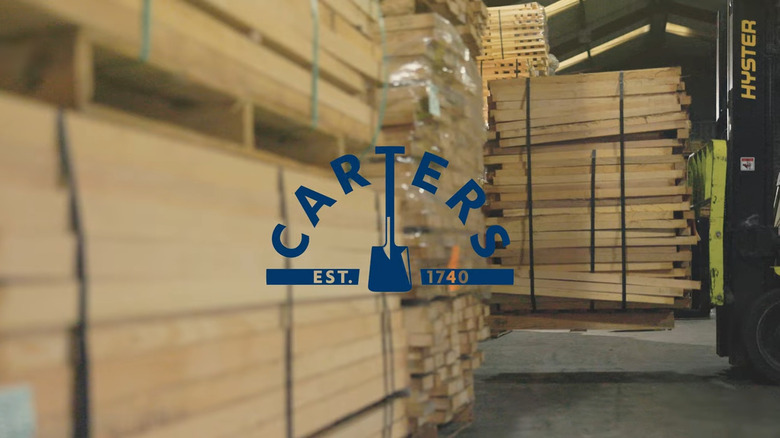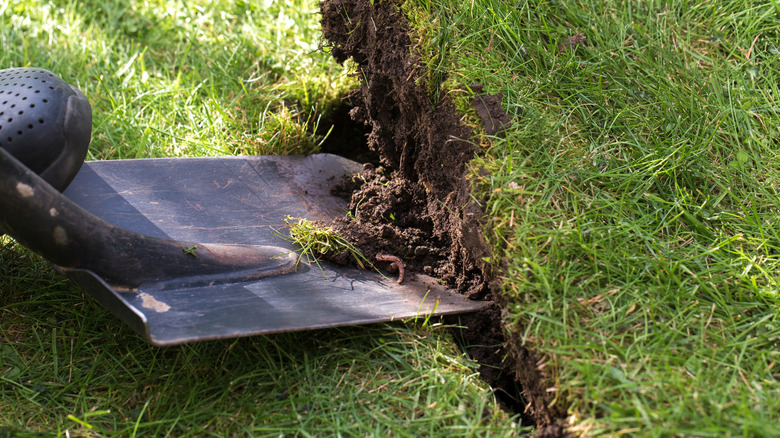This Is The Oldest Hand Tool Brand Still Operating Today
Fein is widely recognized as the oldest power tool brand still in operation, but when it comes specifically to hand tools, such as shovels, picks, pitchforks, and hammers — things that require nothing but good old-fashioned human elbow grease to function — there's Carters. That may not be a name you've ever heard of, but you should, because when it comes to old, it tops the list.
The story of the company now known as Richard Carter Ltd. dates back to 1740, when a blacksmith by the name of Jeremiah Carter founded an edge tool manufacturing business in Highburton, Huddersfield (Britain). While there, he got married and went on to have 12 children, which may not seem all that important, but it has lasting implications for generations to come.
That same year, the War of the Austrian Succession (actually a series of different wars) kicked off, involving most of the great nations in Europe, including Britain. It was also a year in which Sir Robert Walpole was still serving as Britain's first Prime Minister. So, the company has been around as long as the storied country has had that particular political position.
The Carter Shovel helped revolutionize an industry
As its official website claims, Richard Carter Ltd. is "the original hand tool manufacturer," offering a range of tools, including shovels, spades, forks, and rakes for digging and other groundwork-related tasks. They also produce striking tools, such as hammers and sledgehammers, as well as fencing tools like billhooks and crowbars, along with a variety of handles for these tools.
By the turn of the century, the company had become a true family business, run by — you guessed it — many of Jeremiah's sons and even his grandchildren. In 1828, at the tail end of the Industrial Revolution, Jeremiah's great-great-grandson, Richard Carter I, was born. In 1850, he and another family member (a distant cousin named Ben) teamed up and moved the business down the proverbial road (literally just over a mile away) to Dene Works in Kirkburton, where it remained for 150 years.
In 1865, Richard converted the manufacturing facility over to steam engines (invented by Scotsman James Watt, which coincidentally ignited the Industrial Revolution) to power equipment and used gas to light the building. He also built the company's first woodturning department, furnishing it with specialized machinery and even imported Hickory from the U.S. Five years later (1870), the company developed the Carter Shovel — the tool it's most famous for — in response to the burgeoning coal mining industry in nearby Yorkshire and Nottinghamshire. This was roughly the same era in which Great Britain had become known as the "Workshop of the World" because it was producing more than half the globe's iron, coal, and cotton cloth.
Carters has truly been a part of history
Richard Carter II was born in 1887, and as one might expect, he continued to build on the success of his forefathers. The company managed to survive the Boer War (1899 – 1902), and in 1909, Richard Carter Ltd. was incorporated by Richard Carter I's three sons: Wilfred, Arthur, and Robert. They continued the tradition, with their employees mainly consisting of family members.
A few years later (1914), World War I started in Europe, but this was a good thing for Carters because demand actually increased exponentially as warring factions needed hand tools (specifically shovels) by the thousands. During World War II, they were deemed a "Protected Establishment" and received government contracts under the "Essential Work Order," which enabled them to produce more than 1,500 tools a week.
A fire raged through the facility in 1957 that nearly brought it to ruin, but it managed to persevere. After Phillip Carter retired in the 1970s, Philip Everitt was brought in alongside Duncan Carter to direct the company. Everitt was the first person not directly related to the Carter family to hold the position in 234 years. In 2000, Carters relocated from its facility in Kirkburton to Neiley Works in Honley, where it remains as of this writing. The company is now in its sixth generation of family ownership, unlike the sometimes hard-to-decipher ownership of other major tool brands. It's lived through 10 British monarchs (including King George II) and survived three centuries (285 years) of history's brightest and darkest moments, a claim to fame that very few companies can match.

